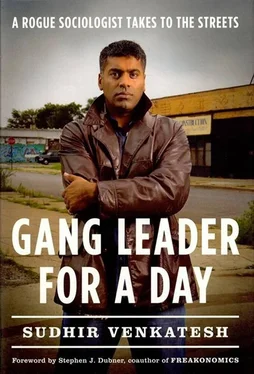So Dorothy, with Princess in tow, went to confront the two men at a local bar where they hung out. Princess was worried, since both of them smoked crack and were prone to violence, but Dorothy feared no one. As Princess later described it, Dorothy stormed into the bar and loudly told the two men they’d have her to deal with if they moved in with Princess. The men threatened to beat up Dorothy and then stomped away. They retaliated by calling Princess’s new landlord and, posing as CHA officials, warned the landlord that Princess was a gang member. The landlord promptly called Dorothy.
He didn’t necessarily believe that Princess was in a gang, he said, but he wasn’t willing to take the chance. So Princess lost her lease. Dorothy eventually found Princess another apartment, but it was smaller, more expensive, and a few miles away from Cherry.
And then Marna was thrown in jail for six months for stabbing her boyfriend. Dorothy moved Marna’s children around from one apartment to another so that the social workers couldn’t find them and send them to foster care. Soon after, Dorothy heard that Candy had promised J.T. that the Black Kings could stash guns and drugs in the new apartment that Dorothy was helping her rent. Since J.T. was paying Candy for this service, Dorothy had little leverage to persuade her to do otherwise. Within a year Candy would lose her lease (and her rent subsidy) when the landlord called the police, having seen so many people tromping in and out of her apartment.
The most astounding story concerning Dorothy-one that I could never independently verify-also had to do with the police. She told me that Ms. Reemes called in Officer Jerry, the rogue cop, who caught her in the lobby, dragged her into a vacant apartment, planted drugs on her, and threatened to arrest her for possession if she didn’t stop competing with Ms. Reemes. When Dorothy refused, Officer Jerry arrested her, but she managed to enlist some other police officers, including Officer Reggie, to set her free. According to Dorothy, Officer Jerry returned two weeks later and told Dorothy that if she just paid Ms. Reemes a share of “her cut”- which, Dorothy insisted, didn’t exist-then he would leave her alone.
In the end Dorothy’s list included twelve families chosen for the Stay-Together Gang. Despite her perseverance, she was able to help only four of them move out together, to neighboring apartments in Woodlawn and South Shore. I would spend much of the next decade keeping track of the Robert Taylor Homes’ former tenants to see how they adapted to life beyond the projects. As it turned out, Dorothy’s success rate was easily as good as that of the various social-services agencies contracted by the CHA, each of which was awarded hundreds of thousands of dollars to carry out the job. Dorothy herself would stay in Robert Taylor until it was demolished, and then she joined her daughter, Lee-Lee, in Englewood, a high-crime, predominantly black neighborhood a few miles away.
Dorothy’s move to Lee-Lee’s house was, unfortunately, a typical outcome for many tenants who left Robert Taylor and other CHA projects. While the goal of the demolition was to move families to safer, integrated communities, the CHA was so inept that nearly 90 percent of the relocated tenants wound up living in poor black areas that left them as badly off as being in the projects, or worse.
In place of the projects, the city began to build market-rate condominiums and town houses, three-story structures tucked cozily together instead of the sixteen-story high-rises separated by vast expanses. Robert Taylor tenants had been promised the right to return to the community once construction was done, but fewer than 10 percent of the units were set aside for public-housing families. It is little wonder that the prevailing wisdom in Chicago is that the Daley administration and the powerful real-estate interests, rather than creating new and improved low-income housing, in fact knocked down the projects to initiate a land grab. As of this writing, the new apartments are set to house mostly middle- and upper-class families.
A few months after T-Bone gave me the Black Kings’ financial ledgers, Ms. Bailey invited me to a back-to-school party for the children in her building. J.T. had given her a thousand dollars to throw the party and to buy the kids some sneakers, clothes, and school supplies.
I hadn’t been spending much time around J.T.’s building in the months leading up to the party. I was generally holed up in the library, working on my dissertation. My advisers and I had agreed that it should explore how families cope with poverty-specifically, how CHA tenants solved problems and kept the community together without much help from the government or charities.
When I arrived for the party, it felt like my first visits from years earlier. There were cars parked all around the basketball court, rap music blasting away, kids running everywhere, and squatters grilling burgers and hot dogs to earn a little money. J.T. and his senior officers were drinking beer and casting an eye over the entire scene. J.T., Ms. Mae, Ms. Bailey, and some of the other tenants greeted me with the same carefree attitude they had showed me when I first began coming around. As I watched Ms. Bailey and some of the other older women tend to the children, I couldn’t help but feel kind of nostalgic. Everyone looked a bit older and more fatigued-just like me, I suppose.
I saw something out of the corner of my eye that stopped me cold: a small garden bursting with bright orange, red, and purple geraniums. In this vast stretch of concrete and patchy lawn, littered with broken bottles, used condoms, and empty crack vials, here was an oasis. I laughed to myself. Why hadn’t I ever noticed it before?
I’d been so caught up with gangs, political chicanery, and the life of poverty that I had missed something so beautiful right there in front of me. What else had I missed because of my incessant drive to hustle?
I thought back to the last time I’d noticed any flowers in Robert Taylor. It had been well over a year earlier. The tenants were preparing for a visit from President Bill Clinton. They were incredibly excited, but also unnerved. His visit was meant to highlight the unprecedented levels of gang violence in Chicago public housing.
Clinton supported the use of police “sweeps,” the warrantless searches that the Chicago Police Department was using to combat the gang and drug problems. While the ACLU and other groups decried the sweeps as a violation of constitutional rights, Clinton argued that the right to “freedom from fear” was more important. He wanted inner-city residents to believe, as he believed, that the scourge of street gangs required extraordinary measures, and his trip to Robert Taylor provided a firsthand opportunity to persuade them.
In the weeks before his visit, the project was turned upside down. The police conducted even more sweeps than usual, sometimes ransacking apartments indiscriminately. They also conducted random spot checks in the building lobbies, arresting a great many suspected drug dealers, including many young men who had nothing whatsoever to do with dealing drugs.
J.T. didn’t go so far as to halt drug sales, but he was a bit more cautious, sometimes having his dealers take customers inside to an apartment to obtain the drugs rather than getting them on the street. He also stopped extorting from local stores, fearing that that might lead to arrest. And he stopped laundering money, stowing his cash in garbage bags until the neighborhood quieted down.
On the streets, city tow trucks hauled away abandoned vehicles- as well as a lot of vehicles that might have looked abandoned but were in fact just old and beat up. On top of all this disorder, the weather was unrelentingly hot and humid.
Читать дальше












